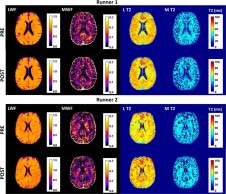Prolonged endurance exercise causes a drastic reduction of myelin in the brain
A study from the University of the Basque Country conducted with marathon runners helps to understand how the energy metabolism of neurons works and what they resort to when they do not have enough glucose supply for their normal functioning.

A study discovers that brain cells use their own myelin as fuel during long-duration exercise
Unlike the rest of the cells in the body, especially muscle cells, it was always believed that the neurons that make up the brain only fed on glycogen from the carbohydrates we ingest in the diet. However, several researchers from the University of the Basque Country wondered what happened to brain cells when they ran out of this fuel, as often happens in long-distance events such as a marathon or a cycling race.
Having energy is essential for the good work of brain functions, an expense that involves no less than 20% of the energy that the human body spends. Obviously, to provide energy at the rate that the brain demands, a fast substrate such as glucose is needed. However, like other cells, neurons must have a plan B for when they cannot count on the necessary glucose.
RECOMENDADO

Tips for getting up early to ride

Complete list of the highest paid cyclists of 2025

Shimmy Effect: why some bikes become uncontrollable when going downhill

How many calories are burned when cycling

What is heart rate variability and how does it affect the cyclist?

Fat Max Training to efficiently eliminate fat

In the case of muscle cells, this alternative energy source is fats if the intensity of the activity is not high or, if the requirements are greater, proteins are broken down to obtain energy from them.
In the case of neurons, they opt for a different fuel: myelin, a fatty structure that wraps around the axons of neurons, those arms that extend forming a kind of mesh and that serve to intercommunicate neurons with each other.
In the study carried out by the University of the Basque Country, the brains of several marathon runners were scanned and it was observed that, after the race, the brain's myelin had significantly reduced, clear evidence that it had been used by the brain as fuel in the absence of glucose. After two weeks, the runners' myelin levels began to normalize.

This research serves to open new lines of investigation, from the brain's requirements and its impact on nutrition to how it affects the athlete's performance. It also opens new windows to understand the influence of neuron metabolism in diseases related to the lack of myelin such as multiple sclerosis from the point of view that axons are damaged by a lack of nutrients, in this case myelin. These lines of research could be aimed at preventing the loss of myelin or enhancing the recovery mechanism of it that has been observed in the study.